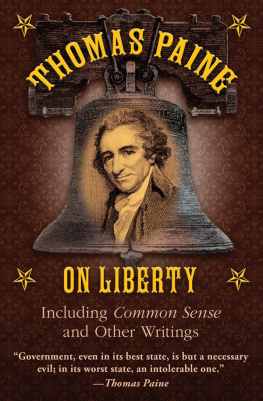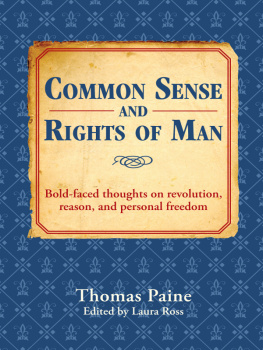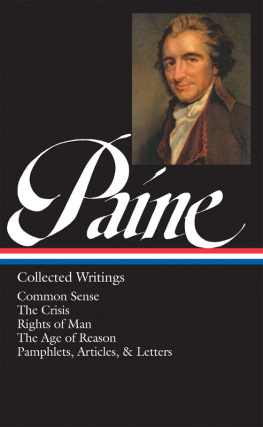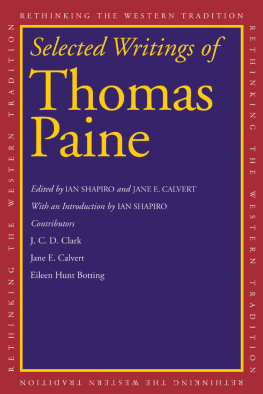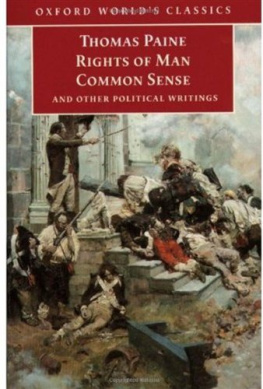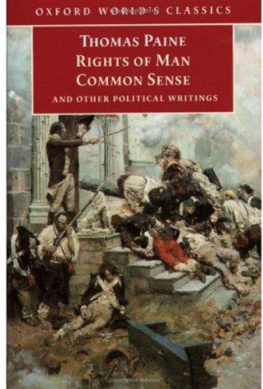Fruchtman Jack - Common Sense, Rights of Man, and Other Essential Writings of Thomas Paine
Here you can read online Fruchtman Jack - Common Sense, Rights of Man, and Other Essential Writings of Thomas Paine full text of the book (entire story) in english for free. Download pdf and epub, get meaning, cover and reviews about this ebook. City: New York, year: 2003, publisher: Signet Classic, genre: Science. Description of the work, (preface) as well as reviews are available. Best literature library LitArk.com created for fans of good reading and offers a wide selection of genres:
Romance novel
Science fiction
Adventure
Detective
Science
History
Home and family
Prose
Art
Politics
Computer
Non-fiction
Religion
Business
Children
Humor
Choose a favorite category and find really read worthwhile books. Enjoy immersion in the world of imagination, feel the emotions of the characters or learn something new for yourself, make an fascinating discovery.

- Book:Common Sense, Rights of Man, and Other Essential Writings of Thomas Paine
- Author:
- Publisher:Signet Classic
- Genre:
- Year:2003
- City:New York
- Rating:3 / 5
- Favourites:Add to favourites
- Your mark:
- 60
- 1
- 2
- 3
- 4
- 5
Common Sense, Rights of Man, and Other Essential Writings of Thomas Paine: summary, description and annotation
We offer to read an annotation, description, summary or preface (depends on what the author of the book "Common Sense, Rights of Man, and Other Essential Writings of Thomas Paine" wrote himself). If you haven't found the necessary information about the book — write in the comments, we will try to find it.
Fruchtman Jack: author's other books
Who wrote Common Sense, Rights of Man, and Other Essential Writings of Thomas Paine? Find out the surname, the name of the author of the book and a list of all author's works by series.
Common Sense, Rights of Man, and Other Essential Writings of Thomas Paine — read online for free the complete book (whole text) full work
Below is the text of the book, divided by pages. System saving the place of the last page read, allows you to conveniently read the book "Common Sense, Rights of Man, and Other Essential Writings of Thomas Paine" online for free, without having to search again every time where you left off. Put a bookmark, and you can go to the page where you finished reading at any time.
Font size:
Interval:
Bookmark:
Secretary For Foreign Affairs To Congress In The American War, And Author Of The Works Entitled "Common Sense" And "A Letter To Abb Raynal"
Collected and Edited by Moncure Daniel Conway
1779 1792
Strictly Not for Commercial Use.
This EPUB eBook is released under a Creative Commons (BY-NC-ND/3.0) Licence. (http://creativecommons.org/licenses/by-nc-nd/3.0/)
Source text and images taken from the Public Domain.
This eBook is provided for free by

www.epubbooks.com
Support epubBooks and make a donation by visiting: www.epubbooks.com/donations.
WHEN Thomas Paine sailed from America for France, in April, 1787, he was perhaps as happy a man as any in the world. His most intimate friend, Jefferson, was Minister at Paris, and his friend Lafayette was the idol of France. His fame had preceded him, and he at once became, in Paris, the centre of the same circle of savants and philosophers that had surrounded Franklin. His main reason for proceeding at once to Paris was that he might submit to the Academy of Sciences his invention of an iron bridge, and with its favorable verdict he came to England, in September. He at once went to his aged mother at Thetford, leaving with a publisher (Ridgway), his "Prospects on the Rubicon." He next made arrangements to patent his bridge, and to construct at Rotherham the large model of it exhibited on Paddington Green, London. He was welcomed in England by leading statesmen, such as Lansdowne and Fox, and above all by Edmund Burke, who for some time had him as a guest at Beaconsfield, and drove him about in various parts of the country. He had not the slightest revolutionary purpose, either as regarded England or France. Towards Louis XVI. he felt only gratitude for the services he had rendered America, and towards George III. he felt no animosity whatever. His four months' sojourn in Paris had convinced him that there was approaching a reform of that country after the American model, except that the Crown would be preserved, a compromise he approved, provided the throne should not be hereditary. Events in France travelled more swiftly than he had anticipated, and Paine was summoned by Lafayette, Condorcet, and others, as an adviser in the formation of a new constitution.
Such was the situation immediately preceding the political and literary duel between Paine and Burke, which in the event turned out a tremendous war between Royalism and Republicanism in Europe. Paine was, both in France and in England, the inspirer of moderate counsels. Samuel Rogers relates that in early life he dined at a friends house in London with Thomas Paine, when one of the toasts given was the "memory of Joshua,"in allusion to the Hebrew leaders conquest of the kings of Canaan, and execution of them. Paine observed that he would not treat kings like Joshua. "I 'm of the Scotch parsons opinion," he said, "when he prayed against Louis XIV.`Lord, shake him over the mouth of hell, but dont let him drop!'" Paine then gave as his toast, "The Republic of the World,"which Samuel Rogers, aged twentynine, noted as a sublime idea. This was Paines faith and hope, and with it he confronted the revolutionary storms which presently burst over France and England.
Until Burkes arraignment of France in his parliamentary speech (February 9, 1790), Paine had no doubt whatever that he would sympathize with the movement in France, and wrote to him from that country as if conveying glad tidings. Burkes "Reflections on the Revolution in France" appeared November 1, 1790, and Paine at once set himself to answer it. He was then staying at the Angel Inn, Islington. The inn has been twice rebuilt since that time, and from its contents there is preserved only a small image, which perhaps was meant to represent "Liberty,"possibly brought from Paris by Paine as an ornament for his study. From the Angel he removed to a house in Harding Street, Fetter Lane. Rickman says Part First of "Rights of Man" was finished at Versailles, but probably this has reference to the preface only, as I cannot find Paine in France that year until April 8. The book had been printed by Johnson, in time for the opening of Parliament, in February; but this publisher became frightened after a few copies were out (there is one in the British Museum), and the work was transferred to J. S. Jordan, 166 Fleet Street, with a preface sent from Paris (not contained in Johnsons edition, nor in the American editions). The pamphlet, though sold at the same price as Burkes, three shillings, had a vast circulation, and Paine gave the proceeds to the Constitutional Societies which sprang up under his teachings in various parts of the country.
Soon after appeared Burkes "Appeal from the New to the Old Whigs." In this Burke quoted a good deal from "Rights of Man," but replied to it only with exclamation points, saying that the only answer such ideas merited was "criminal justice." Paines Part Second followed, published February 17, 1792. In Part First Paine had mentioned a rumor that Burke was a masked pensioner (a charge that will be noticed in connection with its detailed statement in a further publication); and as Burke had been formerly arraigned in Parliament, while Paymaster, for a very questionable proceeding, this charge no doubt hurt a good deal. Although the government did not follow Burkes suggestion of a prosecution at that time, there is little doubt that it was he who induced the prosecution of Part Second. Before the trial came on, December 18, 1792, Paine was occupying his seat in the French Convention, and could only be outlawed.
Burke humorously remarked to a friend of Paine and himself, "We hunt in pairs." The severally representative character and influence of these two men in the revolutionary era, in France and England, deserve more adequate study than they have received. While Paine maintained freedom of discussion, Burke first proposed criminal prosecution for sentiments by no means libellous (such as Paines Part First). While Paine was endeavoring to make the movement in France peaceful, Burke fomented the league of monarchs against France which maddened its people, and brought on the Reign of Terror. While Paine was endeavoring to preserve the French throne ("phantom" though he believed it), to prevent bloodshed, Burke was secretly writing to the Queen of France, entreating her not to compromise, and to "trust to the support of foreign armies" ("Histoire de France depuis 1789." Henri Martin, i., 151). While Burke thus helped to bring the King and Queen to the guillotine, Paine pleaded for their lives to the last moment. While Paine maintained the right of mankind to improve their condition, Burke held that "the awful Author of our being is the author of our place in the order of existence; and that, having disposed and marshalled us by a divine tactick, not according to our will, but according to his, he has, in and by that disposition, virtually subjected us to act the part which belongs to the place assigned us." Paine was a religious believer in eternal principles; Burke held that "political problems do not primarily concern truth or falsehood. They relate to good or evil. What in the result is likely to produce evil is politically false, that which is productive of good politically is true." Assuming thus the visionarys right to decide before the result what was "likely to produce evil," Burke vigorously sought to kindle war against the French Republic which might have developed itself peacefully, while Paine was striving for an international Congress in Europe in the interest of peace. Paine had faith in the people, and believed that, if allowed to choose representatives, they would select their best and wisest men; and that while reforming government the people would remain orderly, as they had generally remained in America during the transition from British rule to selfgovernment. Burke maintained that if the existing political order were broken up there would be no longer a people, but "a number of vague, loose individuals, and nothing more.""Alas!" he exclaims, "they little know how many a weary step is to be taken before they can form themselves into a mass, which has a true personality." For the sake of peace Paine wished the revolution to be peaceful as the advance of summer; he used every endeavor to reconcile English radicals to some modus vivendi with the existing order, as he was willing to retain Louis XVI. as head of the executive in France: Burke resisted every tendency of English statesmanship to reform at home, or to negotiate with the French Republic, and was mainly responsible for the Kings death and the war that followed between England and France in February, 1793. Burke became a royal favorite, Paine was outlawed by a prosecution originally proposed by Burke. While Paine was demanding religious liberty, Burke was opposing the removal of penal statutes from Unitarians, on the ground that but for those statutes Paine might some day set up a church in England. When Burke was retiring on a large royal pension, Paine was in prison, through the devices of Burkes confederate, the American Minister in Paris. So the two men, as Burke said, "hunted in pairs."
Font size:
Interval:
Bookmark:
Similar books «Common Sense, Rights of Man, and Other Essential Writings of Thomas Paine»
Look at similar books to Common Sense, Rights of Man, and Other Essential Writings of Thomas Paine. We have selected literature similar in name and meaning in the hope of providing readers with more options to find new, interesting, not yet read works.
Discussion, reviews of the book Common Sense, Rights of Man, and Other Essential Writings of Thomas Paine and just readers' own opinions. Leave your comments, write what you think about the work, its meaning or the main characters. Specify what exactly you liked and what you didn't like, and why you think so.

